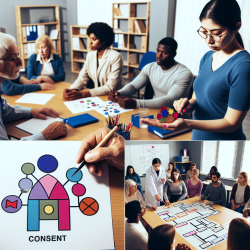Introduction
The topic of sexual consent, especially among individuals with cognitive disabilities, is complex and multifaceted. The systematic review titled "Approaches to Determine and Manage Sexual Consent Abilities for People With Cognitive Disabilities" provides a comprehensive analysis of the methods and themes that influence the determination and management of sexual consent capacity in this population. This blog aims to distill key insights from the review to help practitioners enhance their skills and encourage further research in this critical area.
Understanding Sexual Consent Capacity
Determining sexual consent capacity in individuals with cognitive disabilities requires a holistic approach. The review identifies several methods, including functional capacity assessments, person-centered approaches, and integrated approaches. Each method emphasizes the importance of considering an individual's adaptive abilities, capacities, and human rights.
Functional capacity approaches focus on assessing decision-making abilities through alternative identifiers beyond traditional diagnostic measures. These include literacy skills, self-care abilities, and independent living skills. Person-centered approaches prioritize open communication, committee involvement, and the assumption of capacity unless proven otherwise. Integrated approaches combine these elements with interdisciplinary team discussions to create comprehensive care plans.
Managing and Enhancing Consent Ability
Effective management of sexual consent capacity involves education, attitude adjustment, and the use of advanced directives. Education programs should address the three legal criteria of consent: knowledge, understanding, and voluntariness. These programs are designed to fill knowledge gaps and improve decision-making abilities.
Attitude adjustments are crucial in reframing perceptions of sexual expression in individuals with cognitive disabilities. This involves addressing internal factors, such as unlearned sexual scripts, and external factors, such as societal attitudes and legal frameworks. Advanced directives allow individuals to make decisions about future sexual relationships, preserving their autonomy and preferences.
Encouraging Further Research
While the review provides a robust framework for understanding and managing sexual consent capacity, there is a need for ongoing research. Practitioners are encouraged to explore emergent ideas and integrate them into existing frameworks. This will ensure that approaches remain relevant and effective in addressing the evolving needs of individuals with cognitive disabilities.
Conclusion
Practitioners play a vital role in supporting the sexual rights and autonomy of individuals with cognitive disabilities. By understanding the approaches outlined in the review and implementing them in practice, practitioners can enhance their skills and contribute to better outcomes for this population. Ongoing research and collaboration will be essential in refining these approaches and ensuring that they are grounded in the latest evidence.
To read the original research paper, please follow this link: Approaches to Determine and Manage Sexual Consent Abilities for People With Cognitive Disabilities: Systematic Review.










